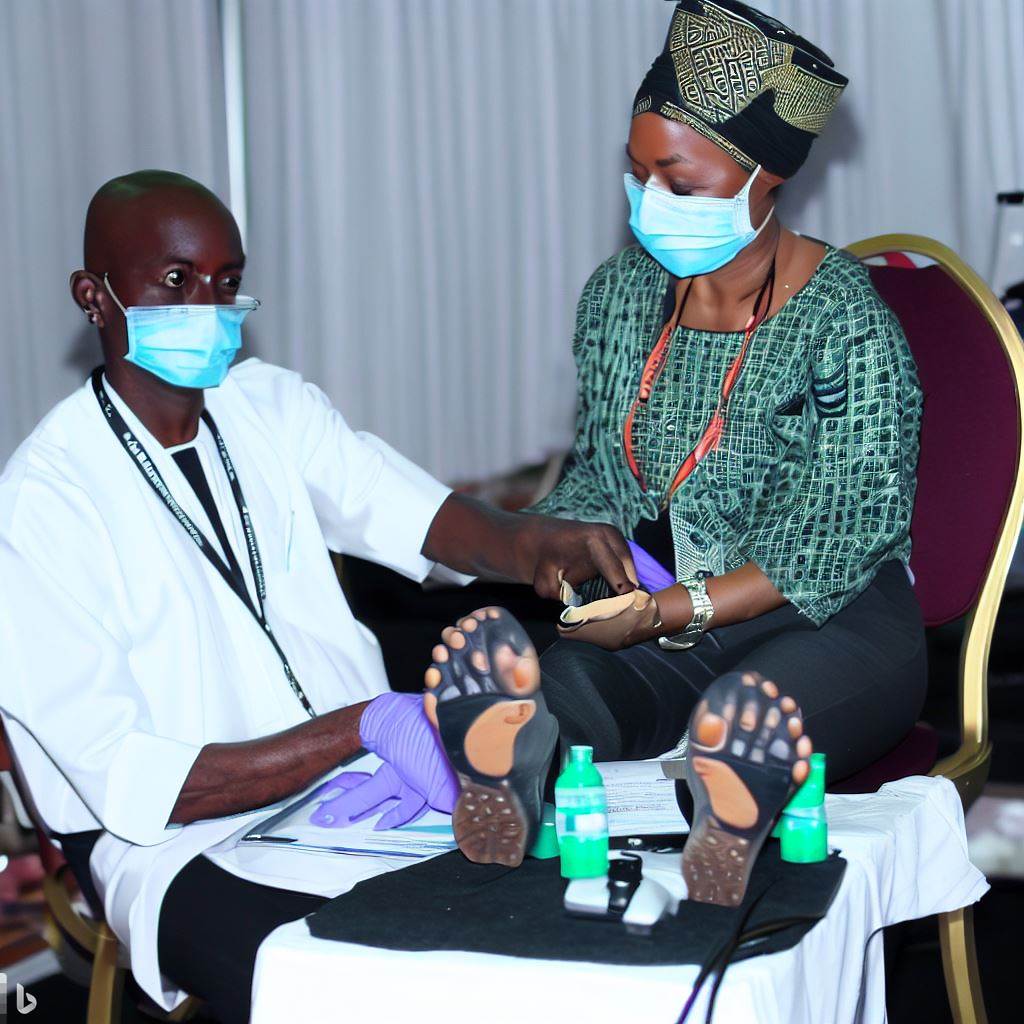Introduction
Podiatry is a medical specialty that focuses on the study and treatment of disorders related to the foot, ankle, and lower extremities. In recent years, podiatry has gained recognition in Nigeria as a specialized field of medicine dedicated to foot care.
The purpose of this blog post is to discuss the latest trends and developments in the Nigerian podiatry profession.
Historical Background of Nigerian Podiatry Profession
Establishment of the first podiatry clinics
The Nigerian Podiatry Profession had its humble beginnings with the establishment of the first podiatry clinics.
Initial challenges and obstacles
However, these early clinics faced numerous challenges and obstacles. One of the initial challenges was the lack of awareness and understanding about podiatry among the general public.
In addition, there was a shortage of trained podiatrists in Nigeria, making it difficult to provide adequate foot care services.
Furthermore, there was a scarcity of specialized equipment and resources needed for podiatric treatments.
Despite these challenges, the pioneers of the Nigerian Podiatry Profession persevered and worked towards creating a solid foundation for the profession.
Recognition and growth of the profession over the years
Over the years, the Nigerian Podiatry Profession has gained recognition and experienced significant growth.
With increased awareness and education campaigns, more Nigerians have come to understand the importance of foot health and seek the services of podiatrists.
The profession has also witnessed an influx of trained podiatrists, both from within Nigeria and abroad, contributing to the expansion of the profession.
Furthermore, the Nigerian government has taken steps to support and promote the development of podiatry by providing funding and resources.
The recognition of the Nigerian Podiatry Association as a professional body has further solidified the status of the profession.
Today, podiatry clinics can be found across Nigeria, offering a range of services such as foot and ankle examinations, orthotics, and diabetic foot care.
The profession continues to grow and evolve, with advancements in technology and research influencing the practice of podiatry in Nigeria.
Overall, the historical background of the Nigerian Podiatry Profession reflects the dedication and determination of healthcare professionals to provide quality foot care services to the Nigerian population.
Read: Orthotic and Prosthetic Associations in Nigeria: A Guide
Current Status of Nigerian Podiatry Profession
Number and distribution of podiatrists in Nigeria
- The number of podiatrists in Nigeria is currently limited, with only a few practicing in the country.
- Podiatrists in Nigeria are primarily located in major cities such as Lagos, Abuja, and Port Harcourt.
- The distribution of podiatrists in Nigeria is uneven, with rural areas often lacking access to these specialized professionals.
Podiatry training and education programs available
- Currently, there are limited training and education programs for podiatrists in Nigeria.
- The University of Ibadan is one of the few institutions offering a podiatry program in the country.
- Podiatry training programs in Nigeria focus on equipping students with the necessary skills and knowledge to diagnose and treat foot and ankle conditions.
National associations and organizations supporting the profession
The Nigerian Podiatry Association (NPA) is the primary national association supporting the podiatry profession. The NPA aims to promote podiatric medicine and advance the professional development of podiatrists in Nigeria.
The NPA works closely with international organizations, such as the International Federation of Podiatrists, to ensure professional standards are upheld.
The Nigerian Association of Foot and Ankle Surgeons (NAFAS) is another organization supporting the podiatry profession in Nigeria. NAFAS focuses on the surgical aspect of podiatry and promotes excellence in foot and ankle surgical procedures.
These national associations provide a platform for podiatrists to network, share knowledge, and advocate for the profession’s growth and recognition.
In essence, the current status of the Nigerian podiatry profession presents challenges and opportunities. The number of podiatrists in the country is limited, with uneven distribution across urban and rural areas.
However, efforts are being made to establish training programs and enhance professional development. National associations and organizations play a crucial role in supporting and advancing the field of podiatry in Nigeria.
With continued support and investment, the Nigerian podiatry profession has the potential to grow and make a significant impact on foot and ankle healthcare in the country.
Read: The Role of Orthotists and Prosthetists in Nigeria
Trends and Developments in Nigerian Podiatry Profession
Advanced technologies and treatment methods
Introduction of laser therapy in podiatry
Laser therapy has revolutionized the way foot conditions are treated. This non-invasive treatment option has shown promising results in managing various podiatric conditions, such as fungal infections and plantar fasciitis.
Implementation of 3D scanning techniques
3D scanning techniques have enabled podiatrists in Nigeria to obtain precise measurements and create custom orthotics. This technology allows for better accuracy and improved patient outcomes.
Podiatric surgery advancements
Increasing popularity of minimally invasive procedures
Minimally invasive procedures have gained popularity in the field of podiatry. These procedures involve smaller incisions, less scarring, and shorter recovery times compared to traditional surgery methods. Patients can expect quicker healing and reduced post-operative pain.
Introduction of robotic-assisted surgery
Robotic-assisted surgery has made its way into the Nigerian podiatry profession. This advanced technology allows for precise and controlled surgical interventions, enhancing the accuracy of procedures such as foot and ankle reconstructions.
Collaboration with other healthcare professionals
Interdisciplinary approach towards foot and ankle care
Podiatrists in Nigeria are increasingly adopting an interdisciplinary approach by collaborating with other healthcare professionals, such as orthopedic surgeons and physical therapists. This collaborative effort ensures comprehensive care for patients with complex foot and ankle conditions.
Integration of podiatry in diabetes management programs
Diabetes management requires a holistic approach, and podiatry plays a crucial role in foot care for diabetic patients. Integration of podiatrists in diabetes management programs allows for early detection and prevention of potential foot complications, helping patients maintain healthy feet.
These trends and developments in Nigerian podiatry have significantly improved the quality of foot and ankle care. The use of advanced technologies, such as laser therapy and 3D scanning, has enhanced treatment options and patient outcomes.
The introduction of minimally invasive procedures and robotic-assisted surgery has transformed podiatric surgery, making it more precise and less invasive.
Additionally, collaboration between podiatrists and other healthcare professionals, as well as the integration of podiatry in diabetes management programs, ensures comprehensive care for patients.
As the field continues to evolve, Nigerian podiatrists are at the forefront of advancements, providing excellent foot and ankle care to the population.
Read: Orthotics and Prosthetics: A Nigerian Rural Perspective
Challenges Faced by Nigerian Podiatrists
Limited awareness and understanding of podiatric services
One of the major challenges faced by Nigerian podiatrists is the limited awareness and understanding of podiatric services among the general population.
Most people in Nigeria are not familiar with podiatry and do not understand the importance of foot care.
This lack of awareness leads to a lower demand for podiatric services, making it difficult for podiatrists to establish successful practices.
Many people continue to rely on traditional healers or general practitioners for foot problems, despite the specialized knowledge and skills that podiatrists possess.
Lack of government recognition and regulation
Another significant challenge is the lack of government recognition and regulation of the podiatry profession in Nigeria. Unlike other healthcare professions, such as medicine or dentistry, podiatry is not officially recognized by the Nigerian government.
This lack of recognition has several implications. Firstly, it means that there are no legal frameworks or guidelines in place to govern the practice of podiatry.
This absence of regulation leaves podiatrists vulnerable to misinformation or unqualified practitioners who may offer ineffective or harmful treatments.
Furthermore, the lack of government recognition also affects the reimbursement of podiatric services by insurance companies.
Without official recognition, podiatrists often struggle to secure coverage for their services, making it financially challenging to sustain their practices.
Insufficient resources and funding for research and development
Nigerian podiatrists face a scarcity of resources and funding for research and development, which hinders the advancement of their profession. Podiatry is a field that requires continuous research and innovation to improve treatment methods and develop new techniques.
However, due to limited financial support and resources, it is challenging for Nigerian podiatrists to conduct research studies or participate in academic collaborations.
This lack of research opportunities and funding limits the growth of knowledge within the field and prevents the implementation of evidence-based practices.
Moreover, the lack of resources also affects the availability of modern equipment and technologies in podiatric clinics. Without access to state-of-the-art tools and facilities, podiatrists may struggle to provide the best possible care to their patients.
Essentially, Nigerian podiatrists face several challenges that hinder the growth and development of the profession.
The limited awareness and understanding of podiatric services among the general population, combined with the lack of government recognition and regulation, pose significant obstacles for podiatrists in Nigeria.
Additionally, the scarcity of resources and funding for research and development further impedes the progress of the profession.
To overcome these challenges, it is crucial to raise awareness about podiatric services, advocate for government recognition and regulation, and allocate more resources for research and development in Nigerian podiatry.
Read: Nigeria’s Orthotics and Prosthetics: Historical Overview

Opportunities and Future Prospects
Potential growth of the podiatry profession in Nigeria
- The Nigerian podiatry profession has immense potential for growth and development.
- With the increasing awareness of foot health issues, the demand for podiatrists is expected to rise.
- As more people become aware of the importance of foot care, the podiatry profession will see an increase in patients seeking treatment.
- This growth provides ample opportunities for podiatrists to establish successful practices and further contribute to healthcare in Nigeria.
- The potential growth of the podiatry profession in Nigeria also opens doors for podiatrists to collaborate with other healthcare professionals, improving overall patient care.
Possibility of establishing more training institutions
- To meet the growing demand for podiatrists, it is crucial to establish more training institutions in Nigeria.
- Currently, there are limited opportunities for individuals interested in pursuing a career in podiatry.
- By establishing more training institutions, aspiring podiatrists can receive quality education and training in Nigeria itself.
- This will minimize the need for Nigerians to seek education and training abroad, thus retaining local talent and expertise.
- Not only will this boost the podiatry profession, but it will also contribute to the overall development of healthcare infrastructure in Nigeria.
Importance of raising awareness and advocacy
- Raising awareness about podiatry is essential to foster its growth and integration into the Nigerian healthcare system.
- Through awareness campaigns, the public can be educated about the role of podiatrists in maintaining foot health.
- Increased awareness will encourage individuals to seek podiatric care and enables early detection and prevention of foot-related problems.
- Advocacy efforts are necessary to create policies that recognize and support the podiatry profession.
- By advocating for the inclusion of podiatrists in healthcare systems and insurance coverage, the profession can gain the recognition it deserves.
To sum it up, the podiatry profession in Nigeria holds immense opportunities and future prospects.
The potential for growth, the establishment of more training institutions, and raising awareness through advocacy efforts are key factors in the further development of podiatry in Nigeria.
As the demand for foot care services increases, active participation from healthcare professionals, policymakers, and the public is vital to harness the full potential of the podiatry profession in Nigeria.
Read: How to Become a Medical Lab Technician in Nigeria
Conclusion
The Nigerian podiatry profession has seen significant growth and development in recent years. Increased awareness and access to services have improved the quality of foot care in the country.
Advanced training programs and collaborations with international organizations have enhanced expertise in podiatric care. The establishment of professional associations and regulatory bodies has ensured ethical practices.
Importance of the Nigerian podiatry profession in healthcare
- Podiatrists play a crucial role in the prevention, diagnosis, and treatment of foot and ankle disorders.
- Effective foot care promotes overall health and well-being, especially among individuals with chronic diseases.
- Early intervention by podiatrists can prevent complications and reduce healthcare costs.
- Podiatric services contribute to improved mobility, independence, and quality of life for patients.
Encouragement for aspiring podiatrists to contribute to the field’s growth and development
- There is a growing demand for podiatric services, presenting ample career opportunities.
- Continuing education and specialization can enhance skills and offer a competitive edge.
- Active involvement in research and professional associations helps advance knowledge and best practices.
- Engaging in community outreach programs creates awareness and promotes foot health awareness.
In closing, the Nigerian podiatry profession has made significant strides, benefiting both patients and the healthcare system. Aspiring podiatrists are encouraged to join this dynamic field and contribute to its growth, development, and the overall well-being of the Nigerian population.




